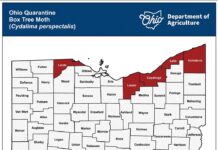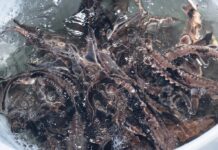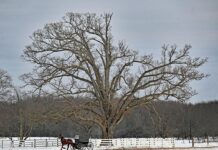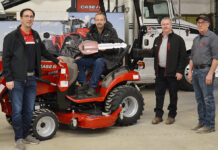CARROLLTON, Ohio – Roger Thomas zigzags across the field on his four-wheeler, bumping over the remains of last year’s soybeans and corn.
He stops the Honda Recon, bends to his left and plunges a soil probe into the soft ground. He needs to collect about 6 inches of soil and years of experience have taught him exactly how hard to push to get that amount.
The probe leaves a perfect circle, just a little bigger than a quarter.
The agronomist slides the sample into a small, brown paper bag. The index finger on his glove is shredded from pushing hundreds, maybe thousands, of soil samples into brown paper bags.
He drives to another part of the field.
Stop. Probe the soil. Bag the sample.
Thomas does this about a dozen times before moving to the next field.
Sometimes he pauses to look at the soil in the probe. In one field, he notices the soil is a little compacted. In a nearby field, it’s much looser.
As he moves through the fields on the windy March afternoon, Thomas also takes note of things like clods of dirt or areas where rain has eroded the topsoil.
Agronomist. Thomas spends hours walking fields, examining soil and checking out crops that aren’t even his. All in an effort to help farmers succeed.
Thomas is a certified professional agronomist who does soil and crop consulting through his Carrollton-based business, Thomas Agronomy.
But Thomas isn’t just an agronomist, he’s a farmer, too. And knowing what it’s like to walk on both sides of the fence gives him the insight to make recommendations that really work on the farm.
As an agronomist, Thomas gets down to the details that can be lost in the rush of farm activity. He studies soil maps, inspects the ground and analyzes lab results. He finds out about weather, bugs, groundhogs, diseases and anything else that might affect the crops.
He isn’t pushing a product, he’s providing information.
Familiar territory. Thomas drives from farm to farm using township and county roads. Some of them aren’t marked very well. Some of them aren’t paved very well. It doesn’t matter. After more than a decade of traveling in the area, he doesn’t need roads signs.
Thomas knows his clients as well as he knows the way to their homes. He knows the names of their children, their wives, their friends.
But the relationship isn’t a one-way street. Thomas’ clients know all about him, too.
Today Thomas is driving a different vehicle on his soil sampling rounds. Almost everyone asks him what happened to the Subaru.
They ask about his wife, his farm, his business.
Recommendations. Thomas sends his soil samples to Brookside Lab
in New Knoxville. He is a Brookside consultant, which means he is part of an association of independent soil and crop consultants affiliated with the lab.
The association, known as the Brookside Society of Professional Consultants, provides a network of information through seminars, training, updates and access to other consultants.
Once the results come back from the lab, Thomas, who holds a bachelor’s degree in agronomy and a master’s degree in forage production, begins the process of making recommendations.
In addition to lab results, he uses information from farmers, such as what’s been growing in the field and what will be growing in the field.
“You get all the material you can and make the best judgment,” Thomas said.
The hardest part of soil and crop consulting is keeping farmers interested.
“You constantly have to prove your worth to these guys.”
And keeping farmers interested means making correct recommendations.
“You want to be right,” Thomas said. “We’re talking thousands of dollars (spent) based on you being right.”
Dedicated. Over the years, Thomas has become an extension of his clients’ farms. He knows their fields, their crops and their soil. He’s walked their land and pored over their lab results. Sometimes he spends more time on their farms than his own.
But for Thomas, it doesn’t matter whose field he’s in or what kind of farm he’s on. His goal is always to help his fellow farmers succeed.
Later in the day, Thomas meets a new client and asks the farmer what he’s been using to fertilize his crops.
The farmer said he’s been using potassium and triple 19.
Thomas considers the amounts for a moment before telling the farmer he can probably cut his starter in half. Within five minutes, the farmer has potentially saved half his money and half his labor.
And the prospect for success is promising.
Get the details
* Thomas Agronomy
Soil and crop consulting
330-575-5378
(Reporter Janelle Skrinjar welcomes feedback by phone at 800-837-3419, ext. 22, or by e-mail at jskrinjar@farmanddairy.com.)










